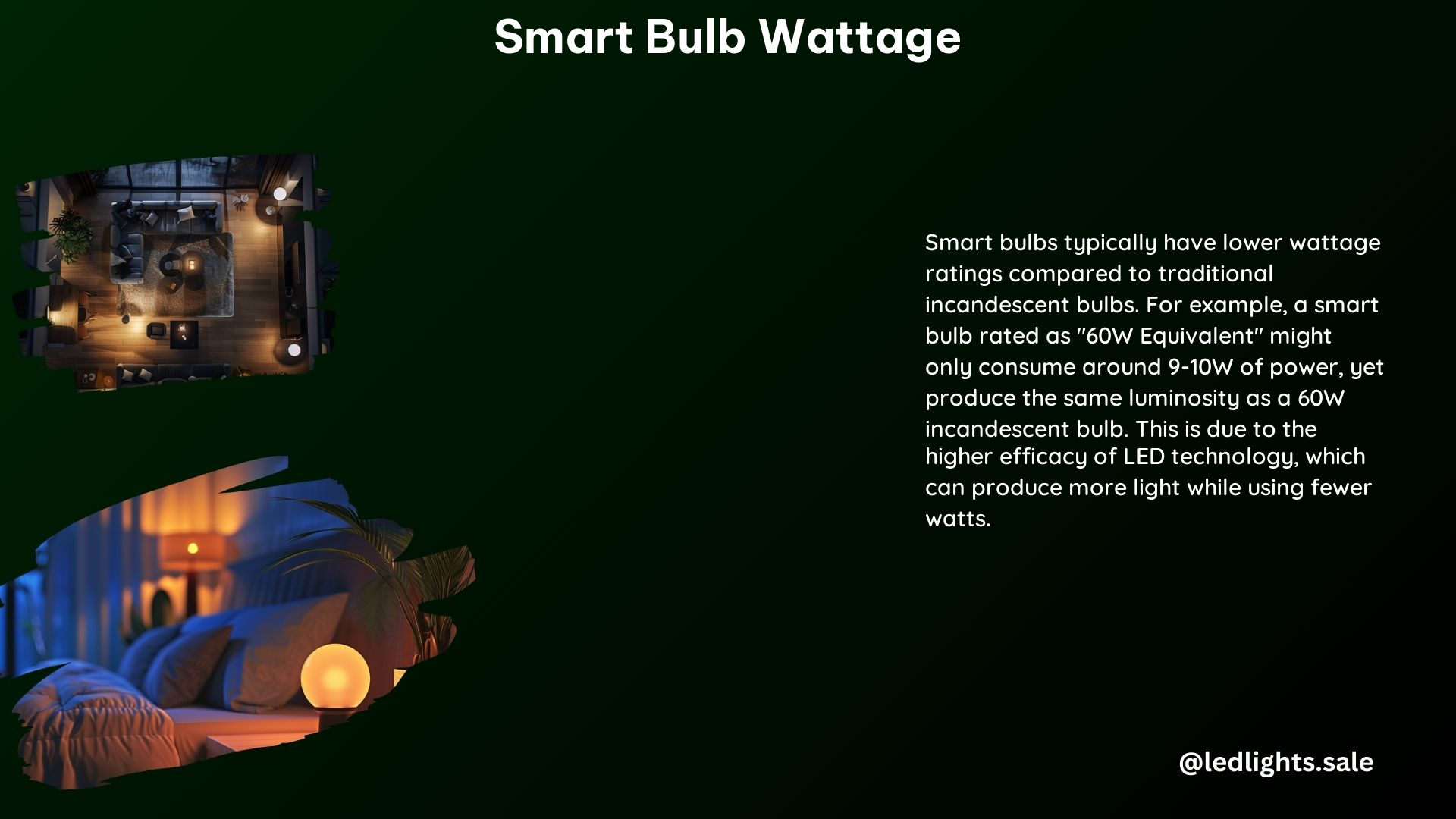Smart bulb wattage is a critical aspect to consider when selecting the right bulb for your lighting needs. Understanding the technical specifications and practical considerations of smart bulb wattage can help you make informed decisions and maximize the benefits of energy-efficient lighting in your home or office.
What is the Actual Wattage of a Smart Bulb Rated as 60W Equivalent?
Smart bulbs rated as 60W equivalent typically consume much less power, around 9-11 watts, due to the higher efficiency of LED technology compared to traditional incandescent bulbs. This significant reduction in power consumption can lead to substantial energy savings and lower electricity bills.
The actual brightness of a smart bulb is measured in lumens, not watts. For example, a 60W equivalent smart bulb might produce around 800 lumens, while a 100W incandescent bulb produces around 1600 lumens. This means that a smart bulb can provide the same level of illumination as a traditional bulb while using a fraction of the energy.
Can I Use a 60W Smart Bulb in a Lamp Rated for 100W?

Yes, you can use a 60W smart bulb in a lamp rated for 100W. The wattage rating on lamps is primarily for heat handling, and smart bulbs produce much less heat due to their energy efficiency. However, it’s essential to ensure that the lamp is certified for the voltage and current of the smart bulb to ensure compatibility and safe operation.
How Does the Wattage of a Smart Bulb Compare to a Traditional Incandescent Bulb?
Smart bulbs are significantly more energy-efficient than traditional incandescent bulbs. They produce the same level of brightness while consuming fewer watts, making them a cost-effective option. For example, a 60W incandescent bulb typically produces around 800 lumens, while a 9-11W smart bulb can produce the same amount of light.
Additionally, smart bulbs, like other vampire appliances, consume a small amount of power even when turned off, but this is typically only a few cents per month, which is negligible compared to the energy savings during use.
Technical Specification of Smart Bulb Wattage
Lumens per Watt
Smart bulbs typically have a higher lumens per watt ratio than traditional bulbs, making them more efficient. The lumens per watt ratio is a measure of the bulb’s efficacy, or its ability to convert energy into light. A higher ratio indicates a more efficient bulb.
Efficacy
The efficacy of a smart bulb is measured by its ability to convert energy into light. LED technology generally has an efficacy of 75-110 lumens per watt, compared to 15 lumens per watt for incandescent bulbs. This means that LED-based smart bulbs can produce the same amount of light while using significantly less power.
Additional Considerations
Color Temperature
Smart bulbs often come with adjustable color temperatures, ranging from warm white (2700K) to daylight (6500K). This feature allows you to customize the ambiance and brightness of your lighting to suit your preferences and the specific needs of a room.
Integration
Smart bulbs can be integrated with various smart home systems and voice assistants, such as Amazon Alexa, Google Assistant, and Apple HomeKit. This integration enhances the functionality and convenience of smart bulbs, allowing you to control your lighting remotely, set schedules, and create custom lighting scenes.
Conclusion
Understanding the technical specifications and practical considerations of smart bulb wattage is crucial for selecting the right lighting solution for your needs. By leveraging the energy efficiency and advanced features of smart bulbs, you can enjoy cost-effective, customizable, and integrated lighting that enhances the ambiance and functionality of your living or work spaces.
References
- PCMag. (2024). The Best Smart LED Light Bulbs for 2024. Retrieved from https://www.pcmag.com/picks/the-best-smart-light-bulbs
- VoltLighting. (n.d.). Lumens to Watts Conversion Chart: Choose the Right LED Bulb. Retrieved from https://www.voltlighting.com/learn/lumens-to-watts-conversion-led-bulb
- ChariotEnergy. (n.d.). Do Smart Bulbs Use Power When Off? Retrieved from https://chariotenergy.com/chariot-university/do-smart-bulbs-use-power-when-off/
- Reddit. (2023). Smart bulb wattage help. Retrieved from https://www.reddit.com/r/smarthome/comments/114g63x/smart_bulb_wattage_help/
- LampShopOnline. (n.d.). Which Light Bulb Wattage Do I Need? Retrieved from https://www.lampshoponline.com/advice/which-light-bulb-wattage-do-i-need
